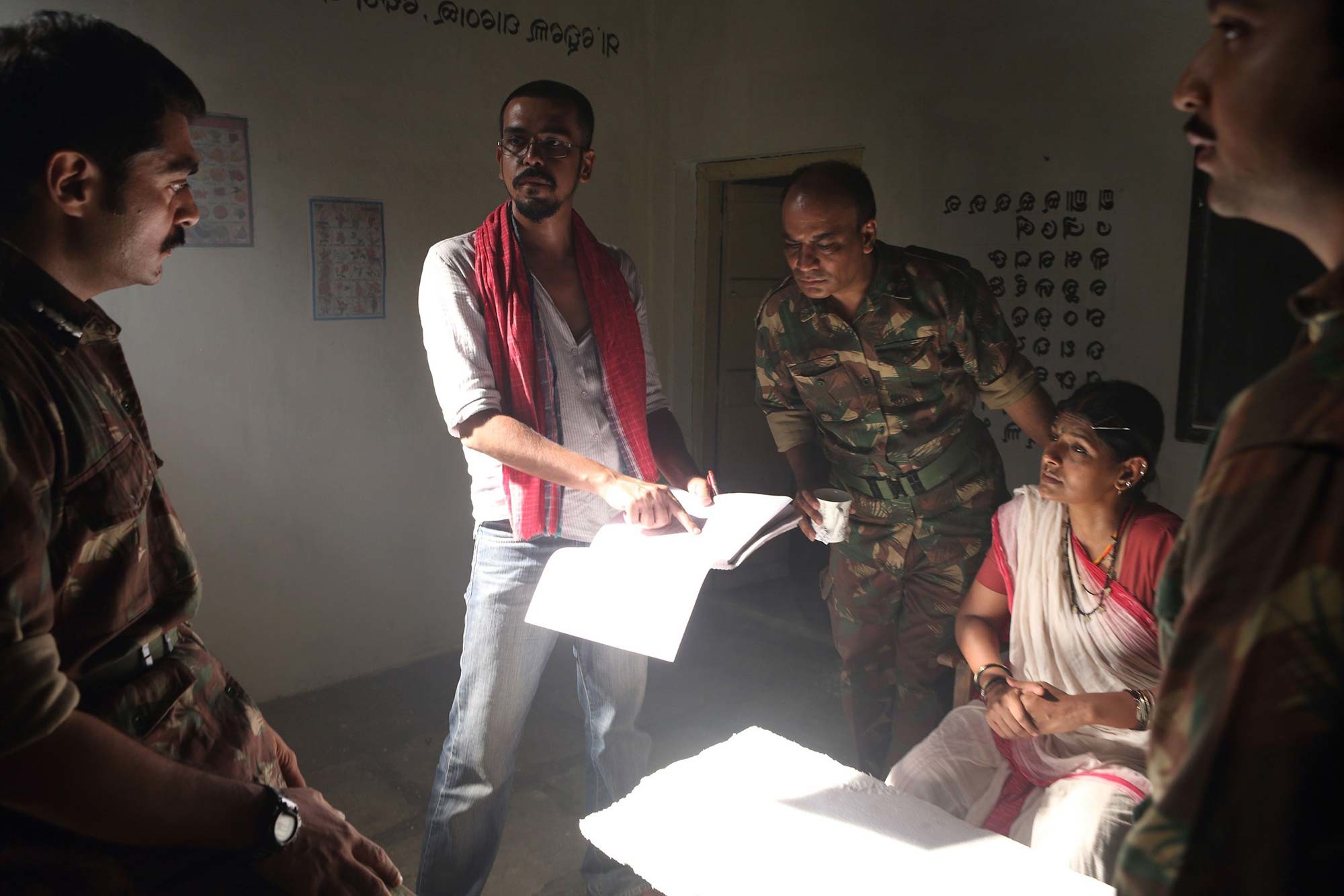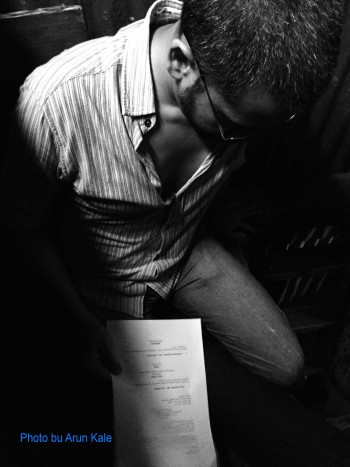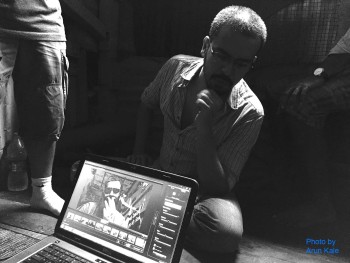
Devashish Makhija on his work, his writing and the 5 rules to remember before making your short by ShortFilmWindow Team
September 20th, 2016
Devashish Makhija, the director of Rahim Murge Pe Mat Ro, El'ayichi & Oonga talks to us about his work, his writing, short filmmaking & his time in the Indian film Industry. This interview is an essential primer for short film-makers before they make their first work.
Hello Devashish! Where did you grow up? What attracted you to film-making?
I wasn’t a film buff growing up. My person was more in tune with reading and music and art. I, in fact, had a problem with my ‘imagination’ not being allowed free rein while watching a film. Everything was imagined for me. It was stifling. Unlike reading a book, or listening to music, where my imagination took full flight. I considered film only because I wanted to do everything simultaneously – write, visualize, choreograph, create music, play with sound, perform, everything. And, to my dismay(!) I realized only this medium that I had reviled all these years would actually allow me that.
I spent most of my early life expressing myself through the word and the static visual. When I surrendered to film, I noticed some interesting things happening to my expression. Not only have I seen my prose writing become more visual – and hence less reliant on descriptors / adjectives / turns of phrase – but I’ve seen my screenwriting become less reliant on exposition through dialogue, because I find myself more able to express mood and a character’s inner processes through silent action. It’s a very personal epiphany, but it seems to be serving me well in both media.
The other thing that drew me to Cinema is that it allows a storyteller to reach out to an unimaginably wide audience. I’ve tried almost every other medium, from writing books to graphic art to theatre, but in this day and age every other medium finds it impossible to expand its audience beyond a fixed limit. Cinema allows unlimited expansion of its audience set. With its mix of music, imagery, sound and human performance, cinema enables a storyteller to transcend every imaginable communication hurdle; if one seeks to, that is.
 You have published books on short stories, books for children, made a feature film, and made many short films. Is there a common connecting thread between all your work?
You have published books on short stories, books for children, made a feature film, and made many short films. Is there a common connecting thread between all your work?
Its really hard to map a thread through all of this. It runs the risk of over-simplification. But that said, the choices we make at every step are decided cumulatively by our circumstances, our personalities, our influences and our ambitions, ALL of which keep changing through our lives.
I’ve been perplexed by our education system all the way back since class 5, when in history too we were told to accept such simplistic truths about our ‘leaders’ and our past that I always doubted what our elders and teachers insisted was the ‘truth’. As the years passed I started to understand that this ‘truth’ is so complex that it cannot be processed by a juvenile mind. Hence our earlier years become an endless series of learning, then unlearning, then learning the same thing again with fewer presumptions and then unlearning it yet again when new complexities present themselves. Some of these questions found their way into two childrens’ books – ‘Why Paploo was perplexed’ and ‘When Ali became Bajrangbali’ – the first questions the things we make little kids presume, while the second does what my first feature film ‘Oonga’ does, questions the ‘gray areas’ of development, and even religion, while we’re at it.
The first film I ever worked on – Black Friday – allowed me the opportunity to ‘research’ like no academic procedure ever teaches you. Anurag dropped some 10 kgs of documents before me, and asked me to ‘research’ this story and draw up an exhaustive timeline of events / people / places, from which we drew up a structure, and he proceeded to weave a screenplay. I figured out this marathon task as I went along, lying and conniving my way through to people and places and archives which otherwise would never have been accessible. What this taught me was the narrative merit of ‘truth’. I found that a compelling fictional ‘story’ finds many many more takers in the audience than even the most interesting piece of documentation of fact. I think the seeds of my current preoccupation were sown then. I decided to tell stories that would find their resonance & material in ‘fact’, but would by themselves be ‘fiction’, so that I could ‘entertain’ even while holding up a mirror to our twisted, greedy, insatiable selves.
its not just our political decisions that I’d like us to reconsider, but our social, economic, industrial, consumeristic, environmental, emotional and philosophical ones as well. And if I can I’d like to catch us really young, when our minds aren’t tainted by the societal-conditioning and cynicism that living in cities for many years brings. I’ve tried then to train myself in telling these question-riddled stories in as ‘accessible’ and ‘entertaining’ forms as possible, so that a wider set of individuals – wider both by age and culture – can access it, and be moved by it. The medium doesn’t matter. If I cant make a film out of a story I’d write it as a book, a graphic novel or a short story or find a way to perform or narrate it somewhere.
Rahim Murge Pe Mat Ro, El'ayich & Agli Baar are very different in their form and the kind of stories they are as well. What is your approach to short film-making?
I wouldn’t say I have ‘an’ approach. I let the subject matter lead the way. For example, we shot on cellphones and laptops for ‘Agli Baar’. The minute I’d decided that the story had to be told through the laptop camera and the mobile phone camera, I could not cut away. So I wrote the screenplay with this in mind. It seems exciting to do that – to work the medium into the script itself. But that doesn’t mean it’ll work with every film/filmmaker.
I couldn’t have worked backwards from the resources for ‘El’ayichi’. That film needed to be treated a certain way – lensing, music, production design – for it to work, given that the story inhabited a hyper-reality. And the elements of that world needed to be created, eg. the dodo.
How to hit this tone consistently to make the story seem believable and seamless? Its never easy to explain to your cast and crew why or how something as bizarre as a Dodo is going to work in this scenario. I have to earn their trust, but at the same time I have to assert myself. If – god forbid – these elements did not work, none of them would ever want to work with me again. This is a risk every filmmaker – from Fellini to Wes Anderson – must be willing to take. Otherwise no new territory can be explored, charted or conquered.
Rahim Murge pe mat ro, on the other hand, was a shot in the dark. Nothing like it had been done before, so once I’d written the script, rajat and I proceeded purely on instinct. The limitations of resources led to the documentary style approach. That juxtaposed with dramatic music made it a narrative style that I myself havent been able to revisit ever since. I have a sequel written ‘Jaane bhi do Dolly’, about Rahim’s fourth wife – the ‘aadhi portugese’. But I want to shoot it in a way that requires some money. And no one’s been willing to give me money to make another film with murga’s and murgi’s. not yet at least. ☺
The one thing that helps me immensely is to have a story bank that I dip into as and when an opportunity presents itself. Through all those years of shelved projects and creative heartache I just kept writing. And now I have so many stories I can pick and choose from that I feel empowered when an opportunity comes my way. What happened with Agli Baar is that I laid out the available resources before me, and then took a peek into my story-bank, and plucked out a story idea that fit the resources I had.
In my case I’m a writer first. I’ve been writing film (and other things – books, poetry, short stories, copy) for over a decade now. So I plan the film thematically on paper itself. I feel, as an independent filmmaker, it is my duty to plan as much as I can on paper – it’s the one stage of the filmmaking process where the least amount of money / resources are at stake – so the most time must be taken only at this stage. When the production begins, the clock starts ticking. Every extra minute spent ‘mulling’ over options is costing someone something. And on a short film most times its costing the filmmaker him/herself. So to minimize the pressure on my own pocket, I take a lot of time on paper and in my own mental and emotional and thematic prep. Only then do I let all the other crew and cast in.
The biggest challenge though in all my films was the severe absence of resources. Now I have an unfair advantage over most short film makers in this city. I’ve been around in the industry for pretty long. I’ve made a feature film Oonga three years ago that hasn’t released yet. I’ve written films for everyone from Aditya Chopra to MF Hussain to Anurag Kashyap, none of which ever saw the light of day. I spent three years writing and directing a big budget animation film under the yashraj-disney tie-up, which too got shelved. So I’ve got the best people in the business currently working on my short films.
On El’ayichi, Abhimanyu Dange (DOP), Charushree Roy (editor), Kaamod Kharade (sound designer) are all FTII alumnus and national award winners. Sachin Lovalekar who did the costumes for Court and Killa dressed the characters. Mangesh Dhakde is the music director of Vihir, Deool, Highway.
In Agli Baar I had the DOP of ‘Shahid’ – Anuj Dhawan; the editor of ‘Gangs of Wasseypur’ – Shweta Venkat; the sound editor of ‘Labour of love’ – Bigyna Dahal; the production designer of ‘Angry indian goddesses’ – Tiya Tejpal.
And how experienced the actors in both films are is fairly evident to all.
What I’m trying to say here is that I had the humongous advantage of working with the best in the business, on all my short films. So these films are not ‘mine’, they belong to a mini army of fantastic filmmakers.
 Many working/established film-makers turn to short film-making because of the freedom it affords and it's seen as a burst of creativity and formal puzzle-solving before returning to the organized sector of feature film-making. "You worry about the right things" as it is said. But, in your experience, what are those things that you are supposed to worry about while writing and making a short film?
Many working/established film-makers turn to short film-making because of the freedom it affords and it's seen as a burst of creativity and formal puzzle-solving before returning to the organized sector of feature film-making. "You worry about the right things" as it is said. But, in your experience, what are those things that you are supposed to worry about while writing and making a short film?
There are a few things I always keep in mind when working within limited means. I discovered these through some introspection.
- It ALWAYS starts on paper. Write the film knowing what you have at your disposal. Its not just silly, but self-defeating to write grand scenes when you’ll never be able to raise the money required to shoot them.
- Use the world around you in your story. The world you inhabit. The world you can use elements from when you shoot. Note, I’m not stating the cliché of ‘write about what you know best’. I write about women with dead husbands and displaced slum dwellers. I don’t know either personally. But I believe I can imagine what they must feel. What I’m saying is set the story in a world who’s resources are available to you for use when you shoot. Don’t put yourself in a place where you have to ‘create’ stuff. It’s a recipe for disaster. Because it’ll need that dreaded ‘B’ word – Budget.
3. Work with people who want to work with you. Its hard enough being writer/director/producer/caterer all rolled into one on your short film. You don’t want to have to ‘handle’ people you don’t know or who don’t care for what you’re trying to do. If someone wants to work with you – and if you feel you can get them on board with your heart and mind – recruit them immediately. One of the major things that gets short films made is the love of the ‘team’. I’ve seen it too many times to not believe it – the more love the team has for the film, the more successful the product. Here I must mention my first a.d. Kalpit Vora who came to me as an intern less than a year ago and has now become my right hand. He loves what we do. And that empowers me to overreach.
4. Keep the short film ‘short’. Most short films I’ve seen – in fact 90% of them – could have been shorter. You’re already low on resources. Why spread them thin and waste them? To maximize the resources you have to cut-cut-cut on paper.
5. Break the rules. It’s the rules of cinema – as laid down by people that came before us – that make us feel like things need to be done a ‘certain way’. That we need a canon 5D at least to shoot. That we need some colour correction to make it look good. Fuck the rules. Break them. Do things like no one ever has before. And new possibilities will open up. Possibilities that can help you do things in a lot less than you believed possible.
Who are your influences?
Even today I’m not a quintessential film buff, very little cinema has really ‘influenced’ me. To date I have a conflicted relationship with the watching of films. Because a film is so complete in its creating of the world, and I have absolutely nothing left to imagine / add on my own while ‘watching’ a film, I’m left feeling cheated every time I watch a film. Even if it is a film I love. So cinema doesn’t inspire me. I consume it sparely. I respect what it can help a storyteller achieve. But it almost never influences my choices.
Instead, art, poetry, music, real life experiences, love lost, death, inequality, conversation, comics, illustration, the look on people’s faces when they are eating, fucking, killing someone, being denied, discovering a devastating secret, the looks in animals’ eyes when they’re startled by the brutality of man – these are some of my influences.
I discovered the pleasure and profound impact of cinema rather late in life. I still see myself as a storyteller first and a filmmaker later. I have much still to consume and learn from. My diet growing up consisted more of literature, art, music, design and poetry, than cinema. RK Narayan’s stories, Dickens, Japanese graphic design, Tintin comics, and a limitless supply of music formed the better part of my diet growing up.
But in my sparse diet of cinema, there have been a few filmmakers though who have moved me tremendously. They have been Kieslowski, Ghatak, Alejandro Innaritu, Raj Kapoor and Hayao Miyazaki.
We love your films! What are you working on now?
Just finished shooting a ten minute film with Manoj Bajpai – ‘TAANDAV’. It releases online in December.
About to shoot a three minute film ‘ABS NT’ for Pocket Films. It features this unbelievable actor I’ve been waiting to work with – Vikas Kumar.
Hopefully Manoj and I go on the floors with our feature film in March. We’ve fought for very long to find finance for it. Finally he’s producing it himself.
And once I’m done with that I need to take a break from life itself to go underground and finish writing my novel.
In the meantime El’ayichi and Agli Baar travel to several festivals from December onwards.
And my book of short stories ‘Forgetting’ is doing its lit fest run.
Geez, I’m going out of breath just listing all of this. I’ve waited ten years for things to happen. And am discovering that the cliché is true – when it rains, it fucking pours!
You can watch Devashish's short film on Rahim Murge Pe Mat Ro on ShortFilmWindow.
*Cover image photo take by Ravi Kachhawa on the sets of Oonga





